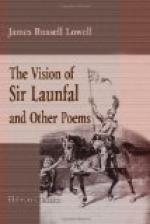Before 1854 Lowell’s literary success had been won mainly in verse. With the appearance in the magazines of A Moosehead Journal, Fireside Travels, and Leaves from My Italian Journal his success as a prose essayist began. Henceforth, and against his will, his prose was a stronger literary force than his poetry. He now gave a course of lectures on the English poets at the Lowell Institute, and during the progress of these lectures he received notice of his appointment to succeed Longfellow in the professorship of the French and Spanish languages and Belles-Lettres in Harvard College. A year was spent in Europe in preparation for his new work, and during the next twenty years he faithfully performed the duties of the professorship, pouring forth the ripening fruits of his varied studies in lectures such as it is not often the privilege of college students to hear. That pulling in the yoke of this steady occupation was sometimes galling is shown in his private letters. To W.D. Howells he wrote regretfully of the time and energy given to teaching, and of his conviction that he would have been a better poet if he “had not estranged the muse by donning a professor’s gown.” But a good teacher always bears in his left hand the lamp of sacrifice.
In 1857 Lowell was married to Miss Frances Dunlap, “a woman of remarkable gifts and grace of person and character,” says Charles Eliot Norton. In the same year the Atlantic Monthly was launched and Lowell became its first editor. This position he held four years. Under his painstaking and wise management the magazine quickly became what it has continued to be, the finest representative of true literature among periodicals. In 1864 he joined his friend, Professor Norton, in the editorship of the North American Review, to which he gave much of the distinction for which this periodical was once so worthily famous. In this first appeared his masterly essays on the great poets, Chaucer, Dante, Shakespeare, Spenser, Milton, Dryden, and the others, which were gathered into the three volumes, Among My Books, first and second series, and My Study Windows. Variety was given to this critical writing by such charming essays as A Good Word for Winter and the deliciously caustic paper On a Certain Condescension in Foreigners.
One of the strongest elements of Lowell’s character was patriotism. His love of country and his native soil was not merely a principle, it was a passion. No American author has done so much to enlarge and exalt the ideals of democracy. An intense interest in the welfare of the nation broadened the scope of his literary work and led him at times into active public life. During the Civil War he published a second series of Biglow Papers, in which, says Mr. Greenslet, “we feel the vital stirring of the mind of Lowell as it was moved by the great war; and if they never had quite the popular reverberation




